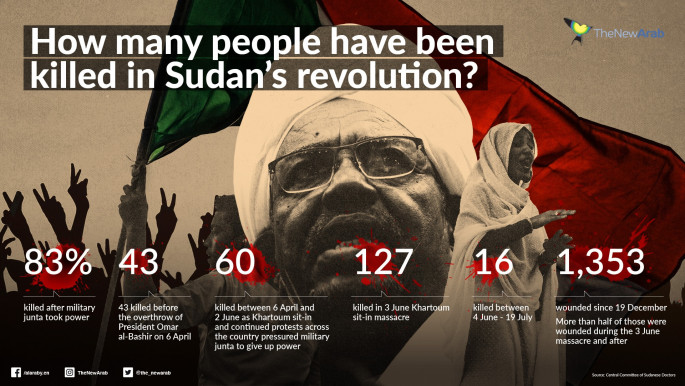Hundreds march in Sudan capital seeking 'justice for martyrs'
More than 250 people were killed and hundreds injured during the mass protest movement that erupted in December last year, according to the Central Committee for Sudanese Doctors.
An estimated 43 demonstrators were killed before Bashir, who ruled Sudan with an iron fist for 30 years, was deposed by the military in a palace coup in April. Many more were killed after the generals seized power, with an estimated 127 killed in the June 3 massacre at a Khartoum protest camp.
Public anger at the militia accused of responsibility for killing protesters in the period after Bashir's ousting has increased over the last week.
Families, friends and activists gathered last week in the capital to honour the victims of the June sit-in massacre, but the event quickly turned to protest when attendees learned a representative of the paramilitary Rapid Support Forces (RSF) was among them.
Protesters and human rights groups pin the blame for the massacre on the RSF, an officialised offshoot of the Janjaweed militias accused of war crimes in the Darfur conflict. Human Rights Watch earlier this month said the brutal massacre was planned and "could amount to crimes against humanity".
Crowds marched from a central Khartoum square to the offices of Prime Minister Abdalla Hamdok on Saturday, demanding authorities deliver justice for those killed and find out about protesters who went missing.
"Blood for blood!" chanted protesters gathered in front of Hamdok's offices in the capital, an AFP correspondent reported.
Dozens of policemen stood guard as protesters, many whistling, clapping and ululating, belted out revolutionary slogans.
"We want justice for martyrs. We are afraid that the criminals might not be judged," said protester Nizar bin Sufian.
 |
| Protester deaths as of 19 July 2019, according to the Central Committee for Sudanese Doctors |
He said protesters welcomed the decision earlier this week by the new authorities to dismantle Bashir's former ruling party, in addition to abolishing an archaic public order law long maligned for the repression of Sudanese women.
"But we have not seen any moves by the government to find those missing or to begin trials of those responsible for the killing of protesters," bin Sufian told AFP.
Witnesses said they saw security and paramilitary forces throwing bodies into the river Nile during the June massacre. While tens of bodies were later found in the river, dozens of protesters remain missing.
Bashir and several senior members of his regime are in prison, with the veteran leader on trial for alleged graft.
Sudan's military has refused to extradite Bashir to the International Criminal Court, where he and three others are wanted on charges of war crimes, genocide and crimes against humanity allegedly committed in Darfur.
Since August, Sudan has been ruled by a joint civilian-military sovereign council headed by General Abdel Fattah al-Burhan.
A transitional cabinet led by Hamdok has been tasked with the day-to-day running of the country.
One of the sovereign council's key members is Mohammad Hamdan Dagalo, commander of the RSF.
Many protesters accuse Dagalo, widely known by his nickname Hemedti, of presiding over the killings of protesters.
A probe by the military earlier this year denied RSF responsibility for the sit-in massacre and charged just seven members of the paramilitary force with killing protesters, alleging they had disobeyed orders as part of a planned dispersal of part of the sit-in.
A seperate investigation, prompted by public anger against the military probe, has since been launched by Hamdok. It is expected to release its report in December.
Agencies contributed to this report
Follow us on Twitter and Instagram to stay connected





 Follow the Middle East's top stories in English at The New Arab on Google News
Follow the Middle East's top stories in English at The New Arab on Google News


